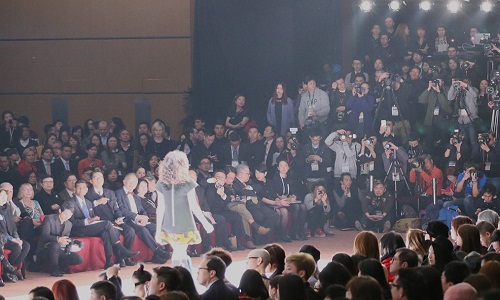FW
Avanprint will be held in the US in September 2017. This is a digital printing technology event. The sourcing platform will feature exhibits from emerging digital textile printing technology developments, including inks, machinery, software and products. This is a new event organized by Messe Frankfurt.
Avanprint USA will act as a networking hub for sourcing professionals, fashion textile buyers and market leaders in the digital printing industry to discuss how these new innovations will benefit their businesses and production processes. A textile print trend area will also be on display at the trade show. The event will serve the needs of the North American apparel and textile industries. It will bring together digital printing, apparel design and sourcing mavens and provide an innovative business platform where forward-thinking exhibitors and visitors can connect directly with technology leaders.
The US has become an exciting, expanding market for digital textile printing. Avanprint USA will provide industry affiliates the opportunity to showcase their collaborative advancement in digital printing technology. For the first six months of 2016, US digital textile production capacity increased 30 per cent. The US digital textile market produces 51 million square meters of fabric each year, making it one of the top global manufacturing divisions.
Chinese textile company Zhejiang Daoqin will invest Rs 600 crores in a textile plant in Uttarakhand. This is likely to help the state’s textile industry take major steps towards growth. This venture will also provide employment to around 8,000 people. Uttarakhand is a suitable business destination for industrialists due to benefits like rebate in per unit electricity bill, exemption from electricity tax, and a 50 per cent rebate in land for setting up a textile industry. The state is expecting more Chinese firms to make investments.
Surplus ground water and proximity to neighboring countries like Nepal and China have attracted industrialists to the textile park. Another advantage is its border with Uttar Pradesh and good transportation facility to other parts of the country.
Zhejiang Daoqin will be the first Chinese company to make 100 per cent foreign direct investment in India. Uttarakhand has launched a mega textile policy under which new projects having an investment above Rs 75 crores will be christened as a mega textile park project. Companies setting up a new unit will be given a 50 per cent rebate on the land price.
The allottee has to pay 20 per cent of the land premium at the time of allotment and the balance payment is to be deposited within seven years in equal installments at the prevailing rate of interest.
The Bangladesh Garment Manufacturers and Exporters Association (BGMEA) has urged 553 garment factories to hurry up in remediation work to avoid the risk of termination of business relations with international buyers. These factories were warned of discontinuing of business relations by Accord, the European brands and buyers’ platform conducting activities, for ensuring workplace safety in the garments industries in Bangladesh for their failure of co-operating with its remediation programs and also for slow progress in remediation works and those factories are faced Stage 1 and 2 notifications by the Accord on Fire and Building Safety in Bangladesh.
BGMEA has already started sending letters to default factories and urged them to speed up remediation process to avoid business termination with the European buyers. It may be recalled that Accord had earlier warned 553 readymade garment factories of termination of business relations for their failure to make expected progress in remediation of their factory buildings. The European buyer’s body had also issued ‘non-compliance notifications’ (called stage-1 of escalation protocol) to 449 RMG factories due to inadequate cooperation in finalising Corrective Action Plans, executing remediation and refusal to meet the requirements of the platform. According to the terms of conditions of Accord, this is the primary warning for business termination, sources said.
Accord has so far cut business relations with 37 suppliers due to their failure in making required progress in remediation. Over 1,600 factories have so far been inspected as the European buyers want to make safe factories from where they procure products. Alliance the platform for North American apparel buyers that has so far inspected around 700 factories. And after inspection, it has terminated business relations with a total of 96 local garment factories for their failure to cope with the compliance issues.
Apparel Training and Design Centre (ATDC), India’s largest quality vocational training provider for the apparel sector recently conducted an 'Interactive Session for Apparel Manufacturing Organizations, Entrepreneurs (Boutiques) & Apparel & Fashion Institutes at its Chandigarh center. This session was conducted by ATDC Training of Trainers (TOT) Academy to showcase the wide range of workshops and trainings that have been conducted earlier to benefit the Apparel Industry Pan India.
The purpose was to understand the requirements in this area so that workshops and trainings may be customized to benefit the region of Chandigarh, Punjab and Himachal Pradesh. RMG makers, industry professionals and fashion Institutes such as Gini & Jony, Eveline International Ludhiana, Active Clothing, Raymond Store, Northern India Institute of Fashion Technology (Mohali), Inter National Institute of Fashion Designing, Home Science College etc, participated in the interactive session.
Speaking on the occasion, Roopali Shukla Advisor, ATDC-TOT Academies & regional ATDCs said that conducting such workshops helped them to understand the needs and the hurdles faced by the Apparel sector. Her company was able to create professionals who will accelerate the growth of the Apparel sector through such training by experienced trainers.
The session focused on discussing topics such as defining roles and responsibility, optimal utilization of human and capital resources, improving quality and its implementation techniques. This would enhance productivity and efficiency and develop lean teams and lean manufacturing which would benefit the Apparel Industry.
ATDC TOT Academy is an institution that operates as a resource centre which sets benchmarks and overall quality parameters for those in the business of skilling in the apparel sector. The key objective of the Academy is to bring about an overall systematic change in the Apparel Industry while providing better quality trainers for industry.
Global fashion brands and retailers have discontinued their business relations with six more RMG factories in Bangladesh for their failure to implement workplace safety measures as per the standards set by two separate platforms of the buyers, Alliance and Accord. With the six, the total number of RMG factories with which the Accord on Fire and Building Safety and the Alliance for Bangladesh Workers Safety have severed business relations on different occasions on the ground of workplace safety, reached 136. Of them, Accord has cut business ties with 41 supplier factories while the Alliance with 95 factories.
The latest is that between September 1-8, Accord terminated business relations with four of its suppliers as the factories failed to make required progress in remediation while Alliance cut business ties with two of its suppliers due to closure of the units.
While the factories which faced Accord termination are Han A Hats & Caps and Hanwen BD and Danys Knitwear and Kento Asia in Gazipur. The factories which were suspended from the Alliance list are Asian Apparels and Campha Outdoor based in Chittagong. Meanwhile, the North American retailers’ group has announced that five more Alliance-affiliated factories completed remediation during the months of August and September. That totals the number of fully-remediated factories to 39.
"The CENTRSTAGE fashion event in Hong Kong saw young fashion designers compete at the Young Fashion Designers’ (YFD) contest and Kenneth Cheung emerged the winner. He received a cash prize and a one-month internship program at the international fashion brand ‘Facetasm’ Japan. The other winners of the 40th Hong Kong Young Fashion Designers’ contest are: Kenneth ‘No Country for Old Man’ first runner-up, Lee Tak-shing ‘Addendum’ second runner-up and the best footwear & accessories design award was taken up by Gim Wong."

The CENTRSTAGE fashion event in Hong Kong saw young fashion designers compete at the Young Fashion Designers’ (YFD) contest and Kenneth Cheung emerged the winner. He received a cash prize and a one-month internship program at the international fashion brand ‘Facetasm’ Japan. The other winners of the 40th Hong Kong Young Fashion Designers’ contest are: Kenneth ‘No Country for Old Man’ first runner-up, Lee Tak-shing ‘Addendum’ second runner-up and the best footwear & accessories design award was taken up by Gim Wong. Backpacker Kenneth Cheung, was declared the overall champion of YDC.

Asked about the essence of his design, Cheung said he had intentionally incorporated military elements into his design by adding electric red embroidery. This created a contrast to the muted palette of green, dark blue and brown hues, leaving a strong impression on the judging panel.
Gim Wong, awarded the second runner-up and the best Footwear & Accessories Design Award was participating in a fashion competition for the second time. Displaying strong enthusiasm for fashion design, Wong aspires to pursue her career in the industry. By her win, she, in a way, encouraged young fashion talent to join the YDC which is one of the most prominent competitions in the industry to gain more hands-on experience.
Hiromichi Ochiai, Designer for Japanese fashion label Facetasm was the VIP judge at the competition this year. He earned the distinction of becoming the first Japanese designer to reach an LVMH prize final. At the 13th Mainichi Fashion Grand Prix in 2013, Ochiai received the Shiseido Award for best new designer of the year. Last year, he presented his 2016 spring/summer collection at Georgio Armani’s Armani / Teatro at the Milan Fashion week. Other senior industry and media representatives joining the judging panel were : Lawrence Leung, Chairman of HKTDC Garment Advisory Committee who was the chief judge; Federico Tan, Director, social/capital, Bonnie Lam, VP, Yoho! Media Division, Reeds Yau, Director, Creative & Visual Merchandising, ImagineX Group, Jonathan Lee, Senior Buyer, Shine Trading (HK) Ltd; and Virginia Chan, Head of Footwear, i.t Apparels Ltd. They selected the best works based on creativity and originality, market potential, workmanship, use of fabrics and overall visual appeal.
"Leading trend forecasting companies Fashion Snoops and WGSN hosted seminars at the CENTRSTAGE fashion event in Hong Kong. The discussions centered around trends for the Asia-Pacific fashion market. While Fashion Snoops led ‘The Key Summary of Retail Trends for 2017’ seminar on September 7, WGSN led the ‘Retail Destinations of the Future’ seminar on September 8. The seminars were part of the CENTRESTAGE fashion event held from September 7-10, organised by the Hong Kong Trade Development Council (HKTDC)."

Leading trend forecasting companies Fashion Snoops and WGSN hosted seminars at the CENTRSTAGE fashion event in Hong Kong. The discussions centered around trends for the Asia-Pacific fashion market. While Fashion Snoops led ‘The Key Summary of Retail Trends for 2017’ seminar on September 7, WGSN led the ‘Retail Destinations of the Future’ seminar on September 8. The seminars were part of the CENTRESTAGE fashion event held from September 7-10, organised by the Hong Kong Trade Development Council (HKTDC).
Trendspotting for Asia-Pacific fashion

For Fashion Snoops, Michael Leow, Asia-Pacific Sales & Marketing Head, presented an analysis of key trends impacting fashion retail for the upcoming year. Leow said ahead of each season, his company works to map and analyses cultural shifts and new ideas that will impact consumer demand and fashion decisions. Talking about mapping macro-trends, Leow said there are 10 macro-trend stories that will impact fashion over the next year. He presented five of these key macro-trend stories.
First trend was ‘Nowstalgia’, defined as the trend story of looking at the past through the lens of today. Consumers are showing a tendency to seek out brands that embrace their glory days with the convenience of today’s technology. He said this trend will also showcase the blurring of digital and analogue elements citing the example of classical jewellery designs incorporating emoji imagery.
‘Beaux Arts’ the second trend is the rise of the artist as an intellectual in response to several seasons of athletic wear. Leow said people are on the lookout for a more intellectual and bookish feel. This trend story will be particularly impactful during the Autumn/Winter 2017-2018 season and feature an eclectic mix of 70’s inspired colours, such as burnt orange, patterns such as the classic chevron, and textiles including denim.
The third trend, is the awakening of the global spirit as people are seeking out new and meaningful travel experiences. For Spring/Summer 2017, this trend story will feature the micro-trend of ‘Raw Coast’ which is a surf aesthetic that features minimalistic but rustic designs. For Autumn/Winter 2017-18, this trend story will feature the micro-trend of ‘Indo’ exemplified by Vietnamese nature and culture. Leow said that this trend will feature colours inspired by the Vietnamese jungle incorporated into local cultural and military designs.
The fourth is ‘New Luxury’ that represents modern desire for genuine quality and natural materials which he said was a luxury aspiration accessible to all. For Fall/Winter 2017-18, he detailed the micro-trend of “Iliad”, an ancient Greek inspired trend story. In terms of colour, this micro-trend will feature a sumptuous range of neoclassical hues such as garnets and milky marbles.
And finally it’s ‘Action’ that represents the cultural shift of masses rebelling against the upper echelons of society while impacted design work will be the crystalizing of discontent. For Autumn/Winter 2017-18, this trend story will be seen in the micro-trend of ‘Re: Volution’ that features military aspects in an urban setting. He explained that designs will have hip-hop attitudes mixed with brash, punk sensibilities and feature materials such as scorched denim, rugged canvas and mesh.
Focus on Millennial consumer
For WGSN Erica Ng, Senior Editor Retail Intelligence Specialising in the Asia Pacific region explored changing consumer expectations and behaviour of the millennial generation that is fuelling the creation of new retail destinations. Understanding shifting gears of the millennial consumers for the upcoming trends impacting fashion designs, Erica examined how the evolution of consumers is fuelling the upcoming trends that will impact retail destinations of the future. Focusing on the millennial consumer generation, Erica explained that this generation is maturing and reaching their peak purchasing years and should be a key target market for retailers. She explained how millennials have an increasingly ambiguous relationship with ownership and prefer experiences over simply purchasing and owning things.
With 68 per cent of consumers now willing to rent their personal belongings for profit, she defined millennials as generation rent. In terms of fashion retail, she said that this generation treats clothes as assets rather than personal goods with sentimental value and that retailers need to cater to this lifestyle in new ways. With this in mind, Erica suggested that trend-forward retailers can capture market share by offering subscription-style services and curated selections to cater to this group that is often inundated with too many options and too little time.
On of retail synergies holding the key with regards to this new style of consumer, the lady discussed how the millennial lifestyle would disrupt traditional retail and shared her insights on upcoming retail destination trends. She explained that successful retailers will need to find synergies between mobile apps, online shopping, physical retail and social media to effectively capture and maintain market share with this generation.
Focusing on digital retail innovations, she identified third party retail platforms and conversational commerce as key retail destinations of the future. She further explained that third party retailing removes the brand away from centre of the retail experience but has the potential to create value for both retailers and consumers. Third party retailing platforms can draw customers by offering the convenience of curating and selling multiple brands on a single platform.
She said these new platforms are also particularly effective when combined with conversational commerce to leverage endorsements from social influencers such as celebrities. She also added that established brands can partner with these new types of platforms in order to expose themselves to new customers even if it means they have to relinquish control of the retail experience.
Wal-Mart Stores has decided to stop selling Egyptian cotton sheets made by Welspun India , after its investigation found the Indian textile giant couldn’t guarantee that its products were legitimate. Wal-Mart arrived at the decision as Welspun was not able to assure them that the products were 100 per cent Egyptian cotton. Wal-Mart spokeswoman Marilee McInnis said that it was unacceptable.
Wal-Mart, the world’s biggest retailer is taking off Welspun products from its shelves in the US and Walmart.com. The company said that it would offer customers who purchased the products a full refund. It will donate the sheets currently on shelves. The move is the latest blow to the Indian textile company after Target Corp said it was pulling thousands of Welspun’s “Egyptian cotton” sheets from its shelves last month and cutting ties with the company after it found Welspun had not used actual Egyptian cotton in the products for about two years.
A spokesman for Welspun acknowledged the Wal-Mart action and said the company is working with retailers to resolve the issue. The company has hired an accounting firm to investigate the cause of the problems and said it is installing a technology to better monitor its supply chain. Two-thirds of Welspun’s sales come from US retailers. Since the Egyptian-cotton issue flared up last month, shares of Welspun have lost 45 per cent of their value.
The potential of technical textiles in India remains largely untapped. But growing industrialisation, increasing access to medical care and huge infrastructure spending it expected to drive growth of technical textile segment. This is expected to boost the industry and help it grow at 20 per cent to touch Rs 1.58-lakh crore mark in the ongoing fiscal.
In the last couple of years, India has been growing at a fast pace in this sector with perceptible signs of expansion being observed in a few specialized segments, observed Textile Commissioner Kavita Gupta while speaking on the sidelines of Techtextil India Symposium 2016. She said that the Centre was giving financial support for growth of the industry and has already announced 15 per cent capital subsidy for investments in technical textiles under the Amended Technology Upgradation Fund Scheme.
Experts say the global technical textiles market is expected to reach $193.16 billion by 2022. Growth of key end-use industries such as agriculture, construction, packaging and automotive in BRICS nations is expected to remain a key driving factor for global technical textiles market. The Commissioner called for increasing spends on R&D in this particular sector that spends around 10-11 per cent on R&D at present and hopes to double the same in coming years.
The 6th edition of the two-day Techtextil India symposium 2016 brought the entire cross-section and stake-holders of the industry on a common platform as they share their knowledge about the global trends and developments, market potential, opportunities and future prospects of this segment.
As planning with vision towards 2030 is obsolete, the Vietnam Textile and Garment Association (VITAS) has asked the government to review and adjust development planning for the industry. Under the current plan, the industry’s export value was targeted to reach $20 billion by 2020 but the figure exceeded $27 billion last year and is expected to hit $31 billion this year. Right from 2010 to 2015, the industry had a stable growth of export value of 15 per cent per year.
Vietnam’s demographics that consists of a population structure with more than double the number of working age than dependents was advantageous for the expansion of the sector. The reason is that only then the Government can help the industry keep up with the country’s integration and make use of the abundant resources.
Deputy Minister of Industry and Trade, Hồ Thị Kim Thoa observed that global textile and garment producers were shifting their place of production to places that had a good labour force and lower production costs. He endorsed VITAS’ recommendation, saying that the industry should make changes to its planning as it was enjoying opportunities stemming from the country joining free trade agreements.
To help textile and garment firms take advantage of opportunities and overcome challenges brought by free trade agreements, the Association suggested the government should update development strategy that was approved by the then Prime Minister in 2008 and the ministry of industry and trade in 2014. VITAS has asked the government to create a development strategy to 2025 with a vision towards 2040. It also wants the government group textile and garment enterprises in concentrated industrial parks.
Currently, there are several textile and garment industrial zones in the northern provinces of Hưng Yên, Thái Bình and Nam Định and the southern province of Đồng Nai and Bình Dương, which cover a few hundred hectares each. VITAS suggested the government allow establishment of textile and garment industrial zones with 500-1,000 ha to draw domestic and foreign capital.












